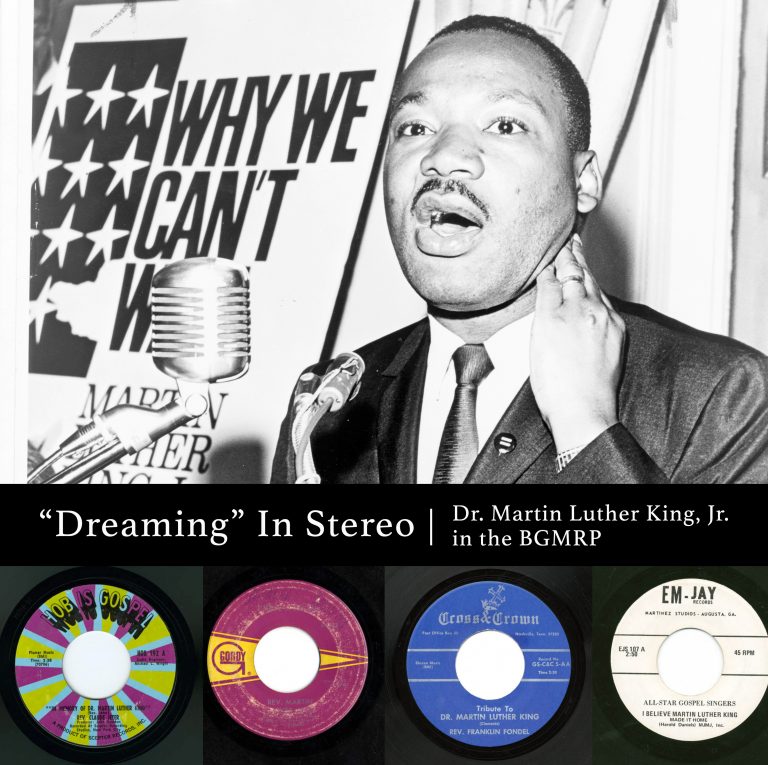MLK’s ‘I Have a Dream’ Inspired Response from Black Gospel Artists

45 RPM records in Baylor’s Black Gospel Music archive illustrate how artists responded creatively to Dr. King’s iconic message
Media Contact: Lori Fogleman, 254-710-6275
Follow Lori on Twitter at @LoriBaylorU
Follow Baylor Media Communications on Twitter: @BaylorUMedia
WACO, Texas (Aug. 22, 2017) – On Aug. 28, 1963, from the steps of the Lincoln Memorial in Washington, D.C., Dr. Martin Luther King Jr. delivered “I Have a Dream” – one of the most iconic speeches in American history and a defining moment of the Civil Rights Movement.
For black gospel artists recording in the years after 1963, King’s speech was fertile ground for creative expression, said Robert Darden, professor of journalism and founder and director of Baylor’s Black Gospel Music Restoration Project (BGMRP).
“These artists responded by creating songs that sampled portions of Dr. King’s recorded audio, drew inspiration from his words or supported the Civil Rights Movement in the wake of its delivery,” Darden said.
Below are four recordings in the BGMRP that embody the ways black gospel artists responded to Dr. King’s message:
- "I Have A Dream," recorded audio of King’s speech, 1963 on Gordy Records 45 RPM disc: The B-Side recording contains nearly four minutes’ worth of King’s speech and ends with raucous applause after his immortal lines, “Free at last, free at last; thank God Almighty, we are free at last!”
- "Tribute to Dr. Martin Luther King" by Rev. Franklin Fondel, ca. 1969 on Cross & Crown Records 45 RPM disc: The Rev. Franklin Fondel recorded these tracks with his Fondel Gospel Singers in the aftermath of King’s assassination on April 4, 1968. Plaintively spoken over an accompanying organ track, Rev. Fondel rhymes about King’s life achievements and his impact on the work of the Civil Rights Movement, noting that King’s love “was the key that opened freedom’s door; no other man could have done more.”
- "I Believe Martin Luther King Made It Home" by The All-Star Gospel Singers, ca. 1969 on EM-Jay Records 45 RPM disc: This bluesy tribute to King features layered vocals, upright bass and electric guitar and a simple vocal refrain: “I believe Martin Luther King made it home, yes I do.”
- "In Memory of Dr. Martin Luther King" by Claude Jeter, 1968 on HOB Records 45 RPM disc: Recorded in the immediate aftermath of King’s death, Jeter’s spoken-word tribute to King’s life and work is set over accompaniment by electric bass, piano and organ.
Darden founded Baylor’s Black Gospel Music Restoration Project more than a decade ago in an effort to identify, acquire, preserve, digitize and catalog recordings from the black gospel music tradition. This music, from the Golden Age of Gospel from 1945 to 1975, was quickly vanishing as albums made the transition to CDs.
Through the work of the Baylor Libraries’ Digital Projects Group, recordings from the BGMRP are available online in the Baylor Libraries Digital Collection, and in some cases includes other materials, such as taped interviews, photographs, press packets, tour books and programs, newspaper and magazine clippings, and sheet music.
Music from the BGMRP also has been included in a permanent exhibit featuring African-American musical history at the Smithsonian Institution’s National Museum of African American History and Culture. The interactive exhibit, “Musical Crossroads,” features these key recordings from the BGMRP:
- “The Old Ship of Zion” by The Mighty Wonders of Aquasco, Maryland (1972)
- “Amen” by Wings over Jordan (1953)
- “I Won’t Be Back” by The Caravans (1962)
- “Over My Head” by Wings Over Jordan (1953)
- “There’s a Tree on Each Side of the River” by The Davis Sisters (1957)
Information provided by: Eric Ames, assistant director for marketing and communications for ITS and Libraries, from the BU Libraries Digital Collections Blog.
ABOUT ROBERT DARDEN
Robert Darden is a professor in the department of journalism, public relations and new media in Baylor University’s College of Arts & Sciences. He is the author of more than two dozen books and hundreds of magazine articles and is the director of Baylor’s Black Gospel Music Restoration Project. Darden is former gospel music editor for Billboard Magazine and author of “People Get Ready: A New History of Black Gospel Music,” “Nothing But Love in God's Water: Black Sacred Music from the Civil War to the Civil Rights Movement, Volume I” and “Nothing But Love in God’s Water, Volume II: Black Sacred Music from Sit-In to Resurrection City.” He also is also a frequent contributor to The Huffington Post on the topics of black sacred music and the Civil Rights Movement and hosts the weekly series, “Shout! Black Gospel Music Moments,” which airs on KWBU-FM in Waco.
ABOUT BAYLOR UNIVERSITY
Baylor University is a private Christian University and a nationally ranked research institution. The University provides a vibrant campus community for more than 16,000 students by blending interdisciplinary research with an international reputation for educational excellence and a faculty commitment to teaching and scholarship. Chartered in 1845 by the Republic of Texas through the efforts of Baptist pioneers, Baylor is the oldest continually operating University in Texas. Located in Waco, Baylor welcomes students from all 50 states and more than 80 countries to study a broad range of degrees among its 12 nationally recognized academic divisions.